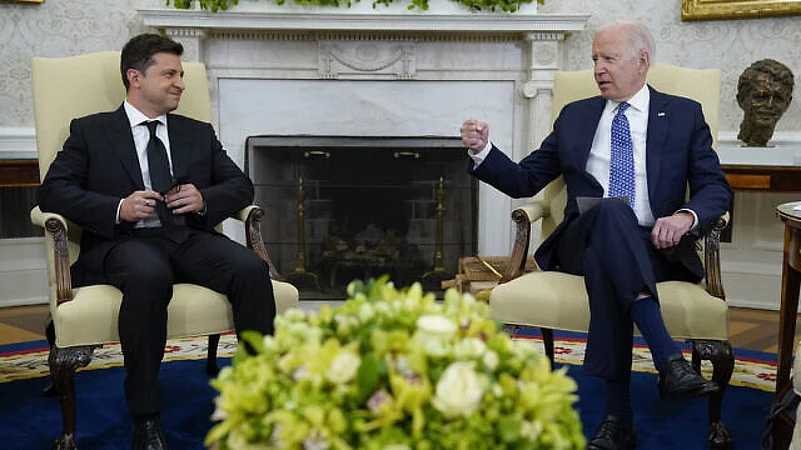US President Joe Biden spoke to his Ukrainian counterpart Volodymyr Zelenskyy to reaffirm his commitment towards the sovereignty and territorial integrity of his country, as his administration mounted a global pressure campaign against Russia to prevent it from invading Ukraine.
“President Joseph R. Biden, Jr. spoke today with President Volodymyr Zelenskyy of Ukraine. President Biden reaffirmed the readiness of the United States along with its allies and partners to respond decisively if Russia further invades Ukraine. He also underscored the commitment of the United States to Ukraine’s sovereignty and territorial integrity,” White House said in a readout of the call.
The leaders discussed coordinated diplomatic efforts on European security, underscoring the principle of “nothing about Ukraine without Ukraine,” the White House said.
During the call, Biden relayed the US’ support for conflict resolution efforts in the Normandy Format, expressing his hope that the sides’ recommitment on January 26 to the terms of the July 2020 ceasefire will help decrease tensions and advance the implementation of the Minsk Agreements.
White House Press Secretary Jen Psaki told reports that the US has seen preparations and buildup at the border and that an invasion could come at any time. “Our assessment has not changed since that point,” she said.
A day earlier, the United States and NATO both separately delivered their responses to Russia, which a senior State Department official said they believe that these responses offer a real opportunity for security improvements across the Euro-Atlantic area if Moscow chooses the path of diplomacy rather than that of conflict or sabotage.
“We and our NATO allies and partners have long been concerned about many of the same issues that Russia raised. And we have long wanted serious talks about these things, including intermediate and short-range nuclear weapons that can reach our allies' territory, and the need for more transparency and risk reduction measures, and updated and reciprocal rules of the road for military exercises,” Assistant Secretary of State for Political Affairs Victoria Nuland told reporters at a news conference.
“We too, have concerns about weapons and military activity around Ukraine, including in Donbas and occupied Crimea. Between the US and Russia, between NATO and Russia, and within the OSCE, we have resolved very difficult security and arms control issues before through negotiations. This was true even in the worst of times, and we need to do that again now,” she said.
She said Russia needs to study whatever has been offered to it.
“So, it's on that basis that we hope Moscow will study what we have offered them and come back to the table, back to the bilateral table with the US, back to the NATO-Russia Council and to the OSCE,” she said.
“The most important thing we heard from Moscow today is that the documents are with President Putin, that he is studying them. And as I said, we hope he will see here a real opportunity for a legacy of security and arms control, rather than a legacy of war,” Nuland said.
At the UN headquarters in New York, its envoy to the world body, Linda Thomas-Greenfield, members of the Security Council must squarely examine the facts and consider what is at stake for Ukraine, for Russia, for Europe, and for the core obligations and principles of the international order should Russia further invade Ukraine.
“This is not a moment to wait and see. The Council’s full attention is needed now, and we look forward to direct and purposeful discussion on Monday,” she said.
Deputy Secretary of State Wendy Sherman spoke with NATO Deputy Secretary General Mircea Geoana, Organisation for Security and Cooperation in Europe (OSCE) Secretary General Helga Schmid, European External Action Service (EEAS) Secretary General Stefano Sannino and, representing the OSCE Chairmanship-in-Office, Polish Deputy Foreign Minister Pawel Jablonski.
They discussed the US and NATO written responses to Russia, continued OSCE and EU engagement, and our ongoing commitment to diplomacy.
They agreed on the importance of continued close coordination and unity in the face of Russia’s unprovoked military buildup on Ukraine’s borders, a media release said.
















